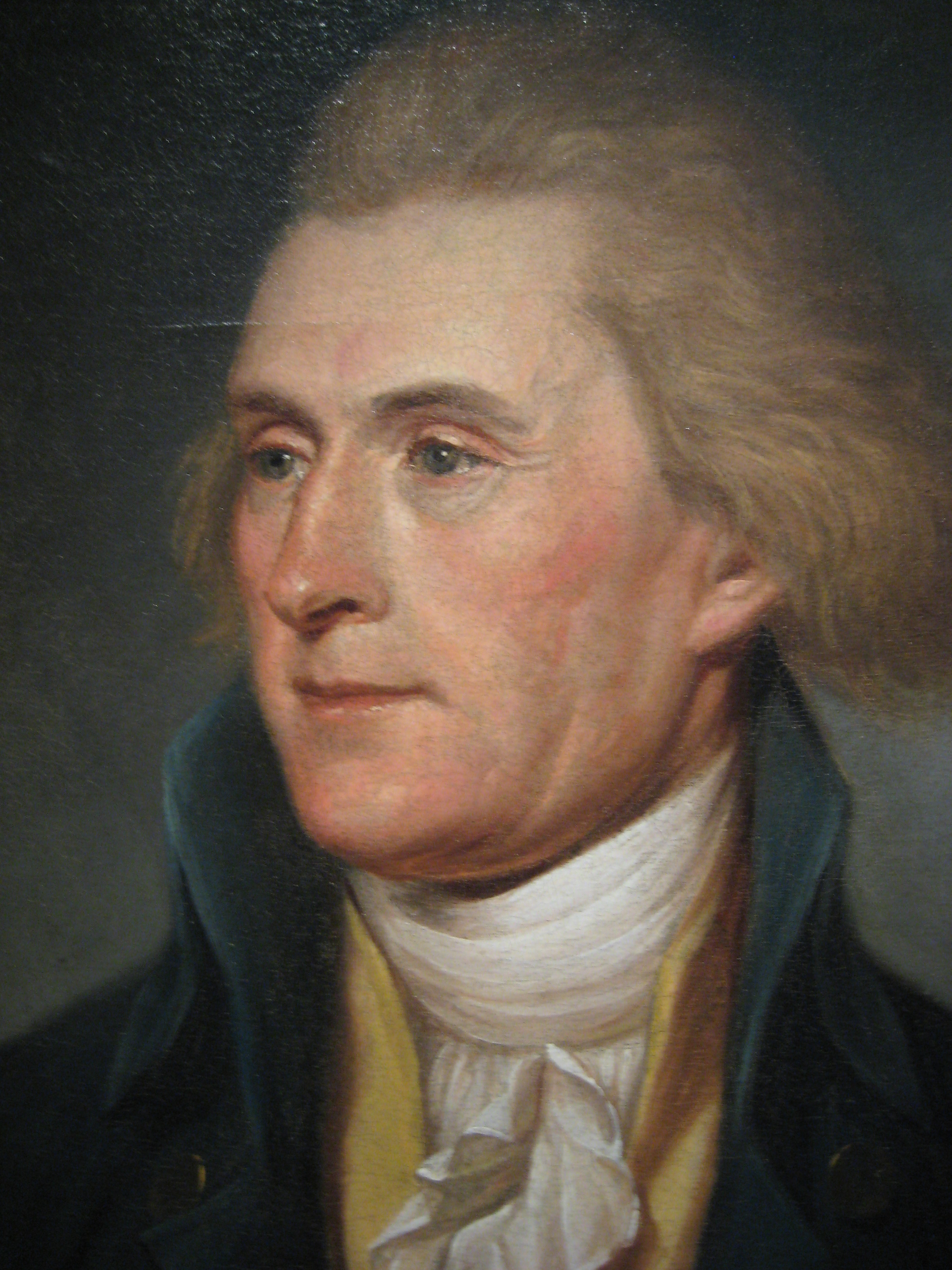 |
| Thomas Jefferson, 1743-1826 |
Jefferson was suffering trying times. He recently lost his wife Martha and another daughter and would soon lose yet another. In all, Jefferson fathered eight daughters and two sons, but death took its toll upon his children. Throwing himself into duties of state brought a welcome respite from personal woes.
In France, Jefferson fell in love with its people, the arts, the architecture, and the land. And then he fell in love.
Less than two years into his stay, Jefferson met 27-year-old Maria Cosway. English although Italian born, she was smart, witty, pretty, an accomplished musician and artist, multilingual with a Tuscan accent, supremely talented… and… married. A marriage of convenience, as it turned out, but still married.
 |
| Richard Cosway, 1742-1821 |
On an extended holiday in Paris, she was ripe, as the gossips declaim, as was he. Jefferson fell for her hard, and she tumbled for him. How physically far the relationship went that season remains a private mystery of history.
The feelings certainly ran emotionally deep. Even as Jefferson succumbed to his duties as envoy, then Secretary of State, Vice President, President, and numerous post-political accomplishments, Cosway never let the flame she carried flicker out.
After they parted in October 1786, Jefferson wrote a lengthy letter of love. Next time we’ll publish this four-thousand word tome of emotion, his now famous ‘Dialogue Between his Head and his Heart’.
 |
| Maria Cosway, 1760-1838 |
In 1789, Jefferson returned to the struggling United States to serve as Washington’s Secretary of State, before being elected to office. Cosway continued gathering renown for her accomplishments. They continued writing one another across the miles and years.
Still corresponding thirty-five years later, Maria was 62 and Jefferson 78. She wrote of their unfulfilled love for one another. “In your Dialogue, your head would tell me, ‘That is enough,’ [but] your heart perhaps will understand, I might wish for more.”
Next week, Jefferson’s famous letter– it’s dense to modern ADD readers, but worth learning the most personal thoughts of the man who would become our third President of the United States.
Good article to read to start a Sunday. Nicely done.
ReplyDeleteRomance is a wonderful thing.
ReplyDeleteHowever, while he was writing wonderful letters, Sally Hemings was also with Jefferson in Paris, and most historians believe Jefferson began a sexual relationship with her in France or soon after their return to Monticello. And maintained it throughout her lifetime: she had six children by him. (According to her son, Madison, who wrote a memoir, she became pregnant by Jefferson for the first time in France, when she was 16; the child died soon after birth.)
Personally, I've always thought that one of the reasons for his attraction to Hemings is that she was his late wife, Martha's, half sister.
Thank you, O'Neil. I thought it an interesting story.
ReplyDeleteEve, that's an intriguing hypothesis, one that Jefferson himself might find difficult to answer. He'd constantly see a reflection of his wife in her.
An interesting “behind the scenes” peek at one of our most complex founding fathers. Only Washington could have united thus rag tag bunch into a government.
ReplyDeleteIt is pretty amazing, Larry. He had to persuade others to set aside their personal drives including their own bodily safety to oppose the British. And they won!
ReplyDeleteGlad Eve spoke up about the Hemmings connection. And Leigh, Sally Hemmings was by many accounts the nearly spitting image of Jefferson's dead wife (they were definitely half-sisters, sharing a father).
ReplyDeleteAnd while that sheds some light on why he may have been tempted, that doesn't take any of the stain away from his actions. He fathered six children by her, left all of his property (and his debts) to his surviving daughter by his wife. And probably in part because he was so deep in debt in later life, he also never freed any of his children by Hemmings, not even in his will (as Washington did).
As a life-long student of history, a long-time writer and teacher of it, I can admire the things in Jefferson which bear admiration, and deplore his baser actions. When we forget our founders were human and fallible, we strip them of their very humanity and make fables of them. The dark part of this stuff is just as instructive as the uplifting parts.
Thanks for posting this, Leigh.
Brian, I believe TJ freed some of Sally's children during his life and the rest in his will. He freed no other slaves. After his death his daughter freed Sally; I suspect that was at TJ's request. https://www.monticello.org/thomas-jefferson/jefferson-slavery/thomas-jefferson-and-sally-hemings-a-brief-account/
ReplyDeleteAs a young bachelor TJ conducted a campaign to seduce the wife of one of his best friends, John Walker. Betsy Walker did not tell her husband at the time because it would have led to a duel but later when Walker decided to make TJ the executor of his will (which would put Betsy under his control if Walker died) she revealed it. TJ reluctantly admitted that his behavior had been "incorrect." He never made any such admission concerning Sally Hemings. https://allthingsliberty.com/2016/04/sexual-liberties-of-thomas-jefferson/
Yes, of all the founding fathers, John Adams was probably the most continent. However, he was irascible and thin-skinned.
ReplyDelete